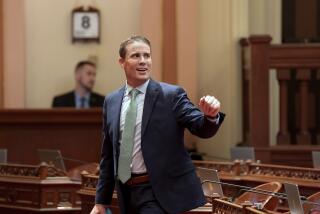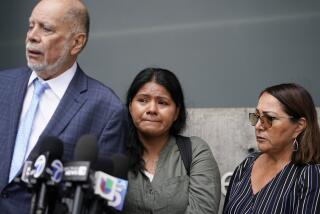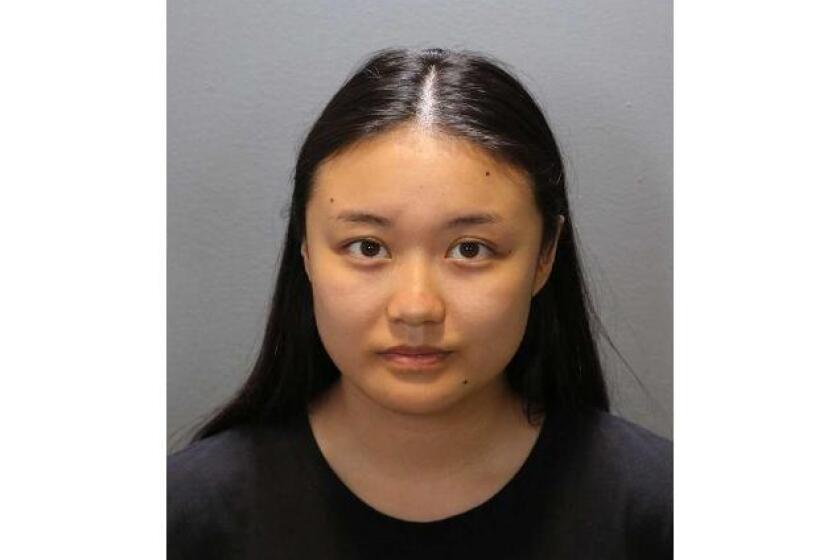Don’t punish people who really need painkillers
It’s not enough that medical insurance companies want to dictate how much and what kind of treatment our illnesses deserve.
Now legislators and law enforcement agencies are butting in, trying to curtail the use of high-powered painkillers because too many people are dying from abuse of prescription drugs.
A physicians group is asking the Food and Drug Administration for stricter guidelines on how the drugs are used, an FDA advisory panel has recommended limiting patients to fewer pills and making prescriptions harder to refill, and Congress is considering a bill that would bump hydrocodone-based pills — Vicodin, Norco and Lortab — into the same controlled-substance class as opium.
They’re trying to solve a serious problem: Prescription drug abuse has eclipsed illegal narcotics as this country’s deadliest overdose menace.
Some of that can be blamed on criminal physicians, like the Orange County doctor sentenced to prison last week for peddling painkiller prescriptions at Starbucks.
But the biggest providers are well-meaning doctors who underestimate the hazards of dependence with commonly prescribed painkillers like Vicodin. “Doctors were led to believe the risk of addiction was low ... that you could prescribe these drugs safely,” said drug expert Dr. Michael Von Korff.
Now studies suggest that as many as 1 in 4 patients wind up abusing their opioid medication.
What the research doesn’t tell us, though, is how many people feel their lives are better because they take the drugs.
::
If doctors over-prescribe painkillers because of ignorance of the risks, why not just educate them to be more prudent rather than demonize the drugs?
That’s the question I asked Von Korff, whose group, Physicians for Responsible Opioid Prescribing, is pushing the FDA to change the analgesics label to recommend them only for severe pain, for a maximum of 90 days and at a maximum daily dose equivalent to 100 milligrams of morphine, or about six 10-milligram Vicodin tablets.
Von Korff said the measure would exempt cancer patients and wouldn’t affect the use of opioids for severe and short-term pain.
“Nobody’s pushing to ban their use,” he said. “But this is one of the largest drug-abuse epidemics in the United States,” he said. And opioids, capriciously used, can do more harm than good.
It’s hard for me to know whether the restrictions are reasonable or cruel. I’ve taken Vicodin only a few times, and the wooziness it induced was almost as bad as my ailments.
But it did relieve the pain. And that’s the gold standard for sufferers, who are fearful and angry about the prospect of losing access to their medication. They are lighting up message boards online with complaints about Big Brother meddling.
::
Von Korff insists the new guidelines won’t consign patients to chronic pain. He just wants patients to know there are risks in these drugs.
He sees the campaign as the best way of educating doctors: making a busy physician think twice before handing out a month’s worth of Vicodin to some guy who tweaked his back in a basketball game.
There are better and safer ways, he said, to treat chronic moderate pain: exercise, alternative medical treatments, psychological options.
It sounds like Von Korff has already been talking to my doctor. I go in with aching hands. He tells me to exercise or stop working so hard when what I’d really like is to pop a pill that will stop the pain and let me sleep at night.
I’m glad my doctor seems to know the risks and steers me clear of dependence. But I don’t want him to hold back my pain relief because he’s afraid I’ll sink into the growing pool of addicts.
We have to be careful not to shift the burden to the masses of suffering patients by telling them that if their pain doesn’t neatly fit into the right categories, just take a long walk or try a round of acupuncture.
The problem is not just ill-informed doctors or inadequately studied drugs.
It’s the power of Big Pharma, selling gauzy images of bedridden patients who could be out scaling mountains if only they had the right prescription, the newest blockbuster drug.
And it’s our quick-fix culture, our fondness for escape from reality, from mediocrity, from pain. We’ll find ways to abuse our drug of choice, Vicodin or marijuana or alcohol, whether it’s legal or not.
Yes, we have to do something to shrink the dimensions of the problem of painkiller abuse. But it would be a shame to let outsized caution narrow sufferers’ options.
More to Read
Start your day right
Sign up for Essential California for news, features and recommendations from the L.A. Times and beyond in your inbox six days a week.
You may occasionally receive promotional content from the Los Angeles Times.






